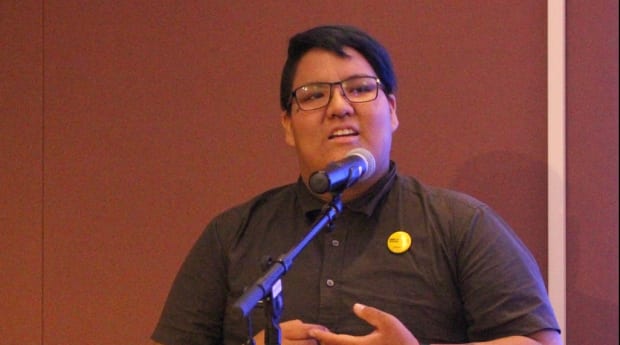The Trans Day of Remembrance (TDOR) is a sobering day to remember those who lost their lives to transphobic violence, but for indigenous activist RJ, it’s also an opportunity for unity.
RJ, a Saulteaux Cree activist who identifies as two-spirit, non-binary and uses the pronoun they, is one of the speakers at Algonquin College Queer Student Alliance’s TDOR workshops on Nov 20, 2015.
“I think [TDOR] is great actually because I feel there’s not a lot of recognition for trans individuals,” RJ says. “It means a lot when I see people come together for something that a lot of us care about but don’t talk about.”
By sharing our experiences and listening in a respectful way, we can start to build unity, says RJ, who will talk about the impact of colonialism on the way indigenous communities view gender.
Other speakers include Dillon Black, a social worker and community activist who helped organize Queer Pride 2015. Anne Lowthian, whose trans daughter Charlie spoke at a Bill C-279 rally at Parliament Hill, is also taking part in the conference, along with Amanda Jetté Knox, a human-rights advocate and mother of a trans child.
Disproportionate rates of violence against black trans women and trans women of colour shows the intersection of oppression based on racism, sexism and transphobia, but for RJ, it’s important to consider the violent history that brought us here.
“The system wasn’t made for us so I feel that that’s the basis for one of the things we have to consider when we talk about trans women of colour being some of the highest of having violence put against them,” they say.
While RJ’s talk will focus on indigenous communities, they say there are similarities when you look at the violent oppression that different communities of colour experience.
“I feel like as trans individuals we’re not as valued as like a white trans woman because people feel like people of colour are so disposable,” RJ says.
Homophobic, transphobic and racist violence is a natural consequence of the violent oppression that began with colonialism, they say. Whenever RJ gives a public talk, they explore the ways that colonialism aimed to destroy indigenous people’s culture and replace it with religious and social norms which bred homophobia and transphobia. Contemporary activism in indigenous spaces is about respectfully challenging the oppressive ideas that came from colonialism, RJ says.
“We have our divides in our community but we’re still working on creating safer spaces — it’s just more of a slower process I guess than the whiter queer community,” they say. “I’d just like to talk about safe spaces within that and how to create that.”
As someone who is non-binary, RJ says they encounter a lot of resistance to the idea that a person doesn’t have to identify as male or female.
“In the indigenous community I don’t think they have a concept of gender roles outside of men and women,” they say. “The idea that you ask someone their pronouns is completely unheard of within the indigenous community and there’s just a lot of lack of awareness overall in the community.”
Even in the trans community, there are people, often from the older generation, who say they don’t understand or accept a person being non-binary, RJ says. Just as biphobia is still encountered in LGBT and mainstream communities, there is a similar persistent belief that gender is binary.
“I feel like people think trans is one direction or the other,” they say. “You’re definitely on this side or on that side and there’s no in between. I think a lot of people go with this mentality from a place of hurt because [of] the struggles they went through with their transition.”
RJ says another barrier they experience in the LGBT community is “subtle racism.” The way forward to build more inclusivity in all communities is respectful communication and education, they say.
In addition to giving a talk, RJ is also going to be smudging at the TDOR conference. Practising traditional medicine, and being able to share it in all communities, is a meaningful way to unify people, they say.
“When I smudge, it not only helps me, but also it’s supposed to change the vibe of the room and make sure everything is going to be feeling at peace,” they say. “That’s the commonality that I can share between both these worlds, between the queer community and the indigenous community because they are so separate but also in the centre I feel that’s where medicine brings me forward in a positive way.”
Algonquin College Queer Student Alliance: Trans Day of Remembrance
Friday, Nov 20, 2015, 10:30am–6pm
1385 Woodroffe Ave, Ottawa
https://www.facebook.com/events/1681288155450707/


 Why you can trust Xtra
Why you can trust Xtra


